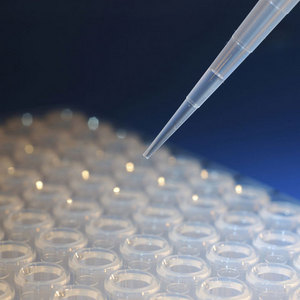Apr. 25, 2007 Research Highlight Biology
Better folds and yields with zinc
Laboratory-based production of zinc-binding proteins optimized

Researchers from several Japanese research institutes have determined the best conditions to synthesize zinc-binding proteins in a test tube. Zinc ions are a critical co-factor needed by many proteins for their proper folding and function. Indeed, it has been estimated that 3% of the human genome encodes zinc-binding proteins, including those that are involved in gene transcription, DNA replication, metabolism and cell signaling.
Shigeyuki Yokoyama from the RIKEN Genomic Center in Yokohama and the University of Tokyo, and his colleagues from RIKEN and other Japanese research institutes report that adding zinc during the synthesis of zinc-binding proteins in a cell-free system optimizes their production. Their findings are published in the Journal of Structural and Functional Genomics 1.
Cell-free systems are composed of extracts from cells that consist of all the cellular components needed to transcribe and translate a given gene. All that is needed to activate the system is the DNA encoding the gene of interest. Given that only this DNA will be present, all the energy of the system is then devoted to the synthesis of just a single protein. Thus, once the DNA is added, in a few hours large quantities of the protein encoded by the gene are soon available for purification by standard methods. The purified protein can then be used for further studies, such as structural and/or functional analysis.
Yokoyama and his team found that for zinc-binding proteins, the addition of zinc during the protein translation process increases both the yield and the stability of the protein due to more proper folding during its synthesis. They confirmed these results by measuring the folding of the purified protein using the technique known as nuclear magnetic resonance (NMR) spectroscopy. The team also demonstrated that the isolated protein had normal function, as shown by specific DNA binding.
According to Yokoyama, the advantage of the cell-free system over cell-based protein synthesis systems is that ligands or co-factors that are necessary for the proper folding and activity of a given protein can be added during its synthesis, even those that are usually unable to cross the cell membrane. These studies could be extended to proteins requiring other small molecule cofactors, such as copper or small metabolites, he notes.
References
- 1. Matsuda, T., Kigawa, T., Koshiba, S., Inoue, M., Aoki, M., Yamasaki, K., Seki, M., Shinozaki, K. & Yokoyama, S. Cell-free synthesis of zinc-binding proteins. Journal of Structural and Functional Genomics 7, 93–100 (2006). doi: 10.1007/s10969-006-9012-1
